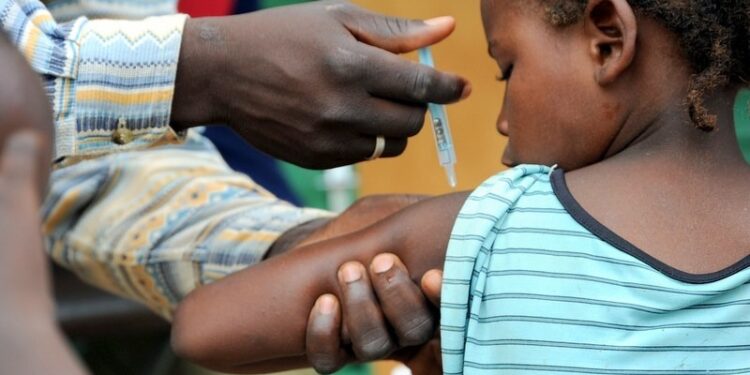The country is witnessing a resurgence in the outbreak of infectious diseases, ranging from Diphtheria, Lassa Fever and more recently, cerebrospinal meningitis (CSM), with cases reported in 22 of the country’s 36 states as well as the Federal Capital Territory (FCT), Abuja.
As of March 26, 2025, 807 suspected cases and 74 deaths have been reported across 22 states and the FCT. The Nigeria Centre for Disease Control and Prevention (NCDC) had expressed concerns over the rising cases of CSM in the country.
The Centre raised the alarm that the country was experiencing a sharp increase in cases, and said that urgent intervention was required to prevent more deaths.
According to the director general of NCDC, Dr Jide Idris, Kebbi state alone has recorded 248 suspected cases and 26 deaths since late January. He said that in Gombe state, 70 suspected cases have been recorded, with 31 confirmed infections and three fatalities.
The NCDC warned that the nation was at the peak of meningitis season, which runs from November to May, with a high risk of transmission due to dry, dusty weather and overcrowding.
Sadly, Nigeria’s approach to disease outbreaks is often characterised by a “fire brigade” approach, meaning that resources are primarily allocated to reactive measures rather than proactive, prevention and preparedness approach.
The “fire brigade” approach often prioritises treating existing cases and containing the spread of the disease, rather than addressing the underlying factors that contribute to outbreaks, such as poverty, poor sanitation, and lack of access to healthcare.
Meningitis, is a seasonal disease and rather than adopt strategies that will mitigate the impact before each seasonal cycle, the country is still found wanting at the end of the day.
For an estimated population of over 200 million, disease outbreaks are to be expected, especially in view of the economic realities.
But the country cannot continue to shy away from making high investments in health systems that can effectively prevent fatalities from infectious and non-communicable diseases (NCDs).
We know that most countries have structures in place to effectively combat any sudden outbreak of infectious diseases, and prominent among these measures is infectious disease surveillance.
According to experts, infectious disease surveillance is very important in monitoring the health of a population, especially in three ways: (1) in describing the current burden and epidemiology of disease, (2) in monitoring disease trends, and (3) in identifying outbreaks and new pathogens.
Unfortunately, most of the diseases currently being actively or passively monitored are those whose activities are being funded by international bodies, like Poliomyelitis.
It must be emphasised that what we need as a nation are proactive measures and collaboration among various stakeholders to address and manage infectious disease outbreaks. In the present circumstance, this need has become more crucial than ever before.
Managing infectious diseases in an economically challenged country like Nigeria requires collaborative efforts of the private and public sectors.
Various governmental health agencies such as the Nigeria Centre for Disease Control and Prevention (NCDC), non-governmental organisations, and social institutions such as schools and religious centres need to remain intentional in safeguarding the healthcare system in the country.
Suitable sustainable policies should be set up to cushion the effect of the current economic situation on the healthcare system and for future outbreaks.
The NCDC described Meningitis as a deadly but preventable disease and that anyone experiencing high fever, stiff neck, or severe headaches should visit a health facility without delay.
It noted that cerebrospinal meningitis is a life-threatening infection of the brain and spinal cord caused by Neisseria meningitidis bacteria.
According to experts, it spreads through coughing, sneezing, and close contact, making overcrowded areas, schools, and IDP camps high-risk zones.
Common symptoms are severe headache and high fever, neck stiffness, vomiting and confusion, sensitivity to light and seizures (in severe cases).
The NCDC said government was intensifying vaccination efforts, but public awareness and early detection remained crucial in preventing fatalities.
Already, emergency teams are working with state governments to conduct mass vaccination campaigns in high-risk areas, strengthen case surveillance and laboratory testing, provide free treatment for confirmed cases at government hospitals and launch public awareness drives to educate citizens on prevention.
We urge parents and community leaders to ensure that children and at-risk individuals get vaccinated.
The NCDC which announced that vaccines are available at health centres nationwide, urged Nigerians to take preventive measures seriously.
It’s better to stay safe by getting vaccinated at the nearest health centre, avoiding overcrowded, poorly ventilated places and practising good hygiene—washing hands regularly, the centre advised.
It also urged citizens to avoid close contact with sick individuals and seek immediate medical attention if symptoms appear. Nigerians are urged to report suspected cases immediately. For emergencies, dial the NCDC helpline: 6232.



